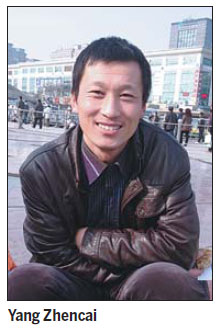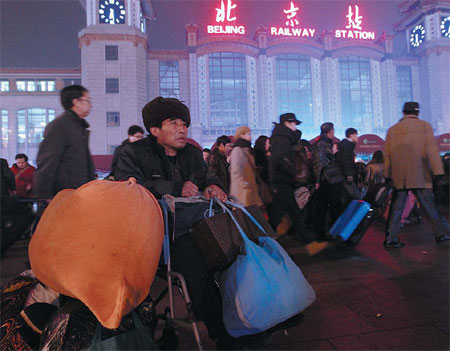The journey home begins for millions
Updated: 2013-02-01 07:33
By He Na and Jiang Xueqing (China Daily)
|
||||||||
|
The Beijing Railway Station is one of the busiest places in China during the world's biggest travel rush. Cui Meng / China Daily |
The world's largest migration of humanity starts, report He Na and Jiang Xueqing.
Every year, at this time, millions of Chinese embark on the world's biggest travel rush - the trek home.
With joy, or possibly frustration after toiling for the past year, a huge proportion of the population will set out on a journey of reunion for the country's most important holiday - Spring Festival.
Possibly as many as a billion people will shuttle between the cities where they live and work and their hometowns for the holiday.
To ensure the smooth running of the world's largest annual migration, extra travel services are being organized from Jan 26 until March 6. A record 3.41 billion trips are expected to be made.
In addition to the railway system, which will bear the brunt of the pressure, airlines, road and shipping networks have all geared up to meet the surge in passenger numbers.
The rail network is expected to handle 225 million trips, while long-distance buses will transport up to 3.1 billion passengers. The combined figure accounts for 99 percent of China's rail and bus capacity, according to Xinhua News Agency.
Some 35.5 million journeys will be made by air during the festival's peak, a rise of 4.9 percent from the same period last year.
Obviously, such a huge number of travelers will stretch the country's transport network to its limits and pose challenges for each part of the system.
While some will enjoy the luxury of air travel, for many millions more the journey means being stuck in overcrowded train carriages for long, boring journeys that will take many hours.
China Daily asked five people, representative of different groups in society, to share their stories of the journey home.

The student
Each Spring Festival since 2011, Lin Tongfei, a 23-year-old graduate student at the School of Journalism and Communication at Renmin University of China, has undertaken the long haul back to his hometown in Pingtan county, Fuzhou city.
Only three trains a day make the journey from Beijing to Fuzhou, the capital of East China's Fujian province.
Train No Z59 leaves Beijing West Railway Station at 3:08 pm and arrives at 10:50 am the following day. Although the journey lasts a grueling 19 hours and 42 minutes non-stop, the train is usually on schedule. A ticket for a hard-sleeper bed costs 436 to 466 yuan ($70-75) for an adult and around 300 yuan for a student.
Train No K45 is much slower, taking more than 34 hours to travel between the cities. Train No D365 only takes 15 hours and 10 minutes. It leaves Beijing at 7:35 am and arrives in Fuzhou at 10:45 pm, but the tickets are more expensive. A second-class soft seat costs 673 yuan.
"D365 is not a good choice for me, given the ticket price and schedule," said Lin. "It arrives at Fuzhou late in the evening, but my home is still a two-and-a-half hour drive away. If I take that train, I have to stay overnight at a relative's home in Fuzhou and then I have to take a bus before 6 am in the winter chill."
Lin was desperate to book a ticket for a hard-sleeper bed on Z59 because the schedule is passenger-friendly and the ticket is affordable. He can sleep on the train and arrive home in the afternoon of the following day.
The pre-sales window opened 20 days before his scheduled departure date of Jan 25, so Lin rose before 8 am and logged on to www.12306.cn, the only official online ticket-purchasing platform operated by China's Ministry of Railways. The website told him tickets were still available, but every time he submitted an order, he received a failure notice, which either informed him that tickets were sold out or that too many people were waiting in front of him.
For three consecutive days, he and a friend attempted to buy a ticket on the website, spending at least 90 minutes online every morning. Their efforts came to nothing. Eventually they gave up. In the end, he got a hard-seat ticket for Z59 through the help of his university.
"The train ticket-purchasing platform is not transparent," he said. "People have no idea whether the tickets are sold out or not. Sometimes, I find dozens of tickets are still available on the website, but when I file an order, the tickets are suddenly down to zero. Often, you will find people buying sleeper-bed tickets after they have boarded the train, even though the website has said the tickets are sold out."
Moreover, not everyone has access to the Internet, which makes it difficult for migrant workers and elderly people, who are not keen on new technologies, to buy tickets online, he added.
The executive
Dong Yanyun, vice-president of marketing at a French Internet company, plans to take a flight home on Spring Festival Eve. She works in Beijing, but her parents live in Ma'anshan in East China's Anhui province.
"I didn't go home for two consecutive years and I'm afraid my parents will scold me to death if I don't return this year," she said, adding that she will give her parents 50,000 yuan ($8,000) in a red envelope to make them happy, because she does not see them often.
Dong traveled to Hong Kong during Spring Festival last year and the Philippines in 2011, rather than sticking to the holiday tradition of a family reunion. Because she wasn't going home, Dong's parents visited her grandparents in Anqing, Anhui province.
"I think there are many other ways to celebrate Spring Festival. It's really unnecessary for such a huge proportion of the population to take the trouble of going home during this one holiday," she said.
"First of all, it's a waste of resources for the entire nation to migrate at the same time and it puts a lot of pressure on the transport network. Second, for many people, Spring Festival means visiting lots of relatives who will ask the same old questions such as 'when are you getting married' and whether you have any plans for a baby. People of my age are really fed up with this sort of conversation," said the 31-year-old executive.
The last time she went home, she was working in Shanghai. The trip was more convenient because Shanghai is much closer to Ma'anshan than Beijing. She spent more than two hours on a high-speed train from Shanghai to Nanjing, Jiangsu province and then had a 40-minute cab ride home.
She prefers going home on other holidays or during her paid leave. However, she only stays for a couple of days, mainly because her hometown - like many small and medium-sized Chinese cities - has little in the way of entertainment other than karaoke, mahjong and spa centers.
"My lifestyle and daily routines are usually disrupted when I return home for the Spring Festival week," she said. "I have nothing to do but eat like crazy and my parents treat me like a little girl. But when I'm here in Beijing, my schedule is always full. I can go to bars and nightclubs with my friends in the evening, and go skiing or climb mountains on the weekend."
She had considered taking her parents to Southeast Asia during this year's holiday, but found the cost of traveling was at least two or three times higher than usual, so the family has decided to make the trip at another time when prices are more reasonable.
The car owner

While most people are fretting about getting a ticket to head home for the Spring Festival, Sun Xuemei, a 32-year-old landscape designer at a real estate company in Beijing, is extremely calm.
Although the annoying experience of being trapped in a seemingly endless queue of vehicles on the expressway during the National Day holiday in October remains clearly etched in her mind, she has still decided to drive back home.
"It will be the sixth year that we have driven back to Jilin city (in Northeast China's Jilin province). I can give a long list of pros for driving back, such as not having to worry about hard-to-get train tickets or expensive air tickets. More important, the departure time is very flexible and it will be convenient to have the car with us during the stay in my hometown," she said.
"Both my husband and I drive, so we can alternate shifts at the wheel every one or two hours during the eight-hour journey. Safety is our top concern. We only drove back once with just two of us. And most of the time friends or relatives who are also qualified drivers travel with us. On the one hand, it makes our trip more fun and on the other, it lowers the cost. We often take turns to tell jokes and play games to kill time. We also stop at every service station for a few minutes to rest," she said.
"Last year, the round trip cost us about 2,000 yuan, which included toll fees and petrol. There were four in the car, so it worked out at 500 yuan per person for the round trip, which is a cheaper than one ticket for a hard-sleeper train.
"Northern China often has heavy snow during Spring Festival, but we are very lucky that we have never become stuck on our way back to Jilin. We hope that good luck will continue this year," said Sun.
Generally, the fear of becoming trapped in heavy snow means that few people choose to drive back to the northeast. So even during the Spring Festival period, the expressway is still relatively empty. But this year, they will be toll-free during the holiday period so it's hard to judge whether people will take advantage of that and drive home, she said.
"To avoid the traffic, we often leave early in the morning. When we arrive at my parents' house, we're usually just in time for dinner. My parents never know what time we will arrive until we are knocking at the door and so if I tell them the day, they will worry until we arrive safe and sound. I hope my parents can come to Beijing to join us for Spring Festival next year. I've worked in Beijing for eight years, but still I don't know what New Year's Eve looks like here," she said.
The office worker

Work assignments often mean that 26-year-old Li Jibing works during China's main holidays.
However, as compensation, the marketing officer at the Education Affairs Division of the China Educational Service Center in Beijing is allowed to take days off in lieu.
But, unlike many colleagues who take time off in the week following the holidays, Li chooses to save them up and extends his Spring Festival celebrations.
The national Spring Festival holiday lasts seven days. That affords plenty of time for people whose hometowns are within relatively easy reach of Beijing, but for Li, who usually has to spend four or five days on the round trip by rail between the capital and his hometown, it's far from long enough.
His hometown is Urumqi, capital of Xinjiang Uygur autonomous region, but only two trains a day travel there from Beijing. One takes around 35 hours and the other 40.
"People joke that the chances of getting tickets for either of the two trains are equal to the odds of winning the lottery," he said.
Because of the high demand, the railway authorities arrange extra trains to relieve the ticket shortage. "These temporary trains have to make way for regular scheduled trains. I once took an 'extra' train back and it took about 70 hours. I left Beijing two days before New Year's Eve, but didn't arrive until the second day of the Lunar New Year," he said.
"I really need to buy a lottery ticket to celebrate my good luck, because I was fortunate enough to get a ticket for the hard-sleeper."
But 40 hours is still a long journey. He said he plans to take a host of gadgets with full batteries on the journey to kill time.
"I only started working two years ago and my current salary is about 4,000 yuan a month. Even if I'm thrifty, I can still only save a few hundred yuan per month after paying for rent, food and transport. Although the journey only takes four hours by air, 2,500 yuan for a one-way ticket is too much of a luxury for me. Even the 575 yuan sleeper ticket is a little expensive," he said.
Li goes home once a year and generally stays about two weeks. He considers the days at home with his parents the happiest time of the year.
"Every year I look forward to the arrival of Spring Festival because I can go home and see my parents. But traveling is really a big headache. The ticket back home is in my hand now, but getting a ticket back to the capital will be another severe battle," he said.
"There are too few trains to Xinjiang and I hope the railway authorities will construct more lines or arrange extra trains to provide us with more choices to reunite with family members."
The migrant worker

Although Yang Zhencai is the father of two daughters at elementary school, he was just like a little boy and far too excited to fall asleep the night before he traveled to join his family in a village in Shanxi province.
Yang hadn't been home for a year. His train from Beijing to Linfen was scheduled to depart at 5 pm on Jan 25, but Yang and another colleague who comes from the same village arrived at the railway station at 10 am.
"Compared with sitting in the construction dormitory and killing time, I would rather sit at the railway station square and watch people going back and forth," said the 32-year-old construction worker.
They sat on their luggage, mainly clothes and quilts, and each had a sesame pancake for lunch.
Yang's journey home lasts roughly the whole day - 15 hours on a train, more than 4 hours on a long-distance bus. Then, an hour shaking along rutted tracks on a county bus is followed by a 20-minute motorbike ride to the front door.
Hoping to save money, Yang bought a regular rail ticket, rather than splashing out on a sleeper.
"The carriage is always very crowded, and sometimes it's hard to reach the toilet. So I plan to buy gifts for my parents and daughters when I arrive in our county," he said.
As the family's only breadwinner, he had transferred almost all of his money back home, except for a few hundred yuan for basic living costs. His budget for Spring Festival is his previous month's salary of about 4,000 yuan.
Even though he's only 32, people often mistake him as being in his early 40s.
"I began to work at a construction site when I was just 17. Now, I often regret that I gave up my studies so early. I won't let my daughters repeat my mistake. As long as they want to study, I will try my best to pay for them," Yang said.
He was happy that he managed to buy a ticket after queuing for just five minutes. "I queued for an entire night last year to get the same ticket. It's much better than before," said Yang.
He has been working in Beijing for six years, but every year he makes the round trip home on a regular ticket. "To tell the truth, I've never even been inside the sleeper carriage. The ticket is far more expensive than a ticket for a seat. I would rather save the money to buy clothes for my daughters," he said.
Yang plans to stay at home for about a month. "I really want to stay longer, but the whole family needs my money to live, so I have to go back to Beijing to earn more," he said.
"My biggest hope is that I can find a job nearer home where I can earn almost the same salary as in Beijing. My daughters are getting older and the family needs a man at home," he said.
Han Junhong contributed to this story.
Contact the writers at hena@chinadaily.com.cn and jiangxueqing@chinadaily.com.cn
(China Daily 02/01/2013 page6)

 Li Na on Time cover, makes influential 100 list
Li Na on Time cover, makes influential 100 list
 FBI releases photos of 2 Boston bombings suspects
FBI releases photos of 2 Boston bombings suspects
 World's wackiest hairstyles
World's wackiest hairstyles
 Sandstorms strike Northwest China
Sandstorms strike Northwest China
 Never-seen photos of Madonna on display
Never-seen photos of Madonna on display
 H7N9 outbreak linked to waterfowl migration
H7N9 outbreak linked to waterfowl migration
 Dozens feared dead in Texas plant blast
Dozens feared dead in Texas plant blast
 Venezuelan court rules out manual votes counting
Venezuelan court rules out manual votes counting
Most Viewed
Editor's Picks

|

|

|

|

|

|
Today's Top News
Boston bombing suspect reported cornered on boat
7.0-magnitude quake hits Sichuan
Cross-talk artist helps to spread the word
'Green' awareness levels drop in Beijing
Palace Museum spruces up
First couple on Time's list of most influential
H7N9 flu transmission studied
Trading channels 'need to broaden'
US Weekly

|

|








